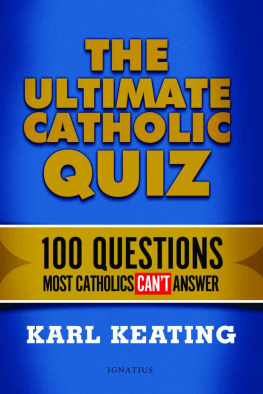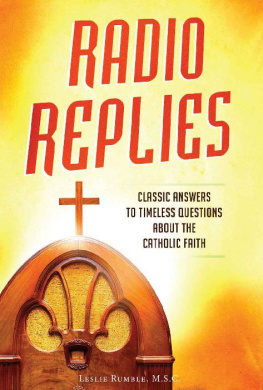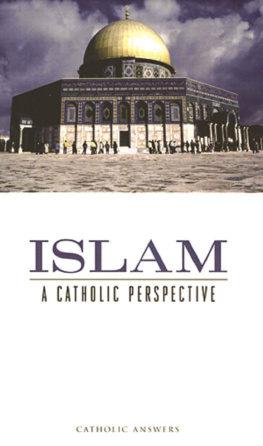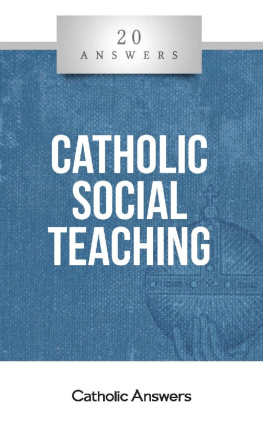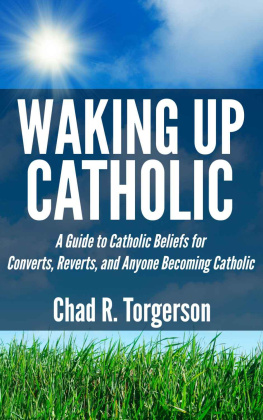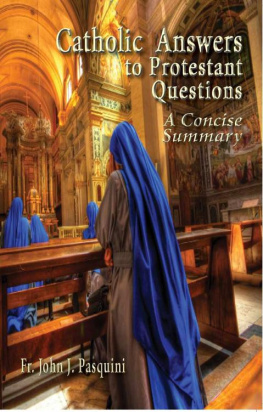Peggy Frye - 101 Quick Questions with Catholic Answers Sexuality
Here you can read online Peggy Frye - 101 Quick Questions with Catholic Answers Sexuality full text of the book (entire story) in english for free. Download pdf and epub, get meaning, cover and reviews about this ebook. year: 2013, publisher: Catholic Answers, genre: Religion. Description of the work, (preface) as well as reviews are available. Best literature library LitArk.com created for fans of good reading and offers a wide selection of genres:
Romance novel
Science fiction
Adventure
Detective
Science
History
Home and family
Prose
Art
Politics
Computer
Non-fiction
Religion
Business
Children
Humor
Choose a favorite category and find really read worthwhile books. Enjoy immersion in the world of imagination, feel the emotions of the characters or learn something new for yourself, make an fascinating discovery.

- Book:101 Quick Questions with Catholic Answers Sexuality
- Author:
- Publisher:Catholic Answers
- Genre:
- Year:2013
- Rating:4 / 5
- Favourites:Add to favourites
- Your mark:
- 80
- 1
- 2
- 3
- 4
- 5
101 Quick Questions with Catholic Answers Sexuality: summary, description and annotation
We offer to read an annotation, description, summary or preface (depends on what the author of the book "101 Quick Questions with Catholic Answers Sexuality" wrote himself). If you haven't found the necessary information about the book — write in the comments, we will try to find it.
Peggy Frye: author's other books
Who wrote 101 Quick Questions with Catholic Answers Sexuality? Find out the surname, the name of the author of the book and a list of all author's works by series.
101 Quick Questions with Catholic Answers Sexuality — read online for free the complete book (whole text) full work
Below is the text of the book, divided by pages. System saving the place of the last page read, allows you to conveniently read the book "101 Quick Questions with Catholic Answers Sexuality" online for free, without having to search again every time where you left off. Put a bookmark, and you can go to the page where you finished reading at any time.
Font size:
Interval:
Bookmark:

101 Quick Questions with Catholic Answers
Sexuality
101 Quick Questions with Catholic Answers
Sexuality
Peggy Frye
C ATHOLIC
A NSWERS
PRESS
San Diego
2011
101 Quick Questions with Catholic Answers Sexuality
2011 by Catholic Answers, Inc.
All rights reserved. Except for quotations, no part of this book may be reproduced or transmitted in any form or by any means, electronic or mechanical, including photocopying, recording, uploading to the Internet, or by any information storage and retrieval system, without written permission from the publisher.
Published by Catholic Answers, Inc.
2020 Gillespie Way
El Cajon, California 92020
1-888-291-8000 orders
619-387-0042 fax
catholic.com
Cover by Devin Schadt
Interior design by Russell Design
ISBN 978-1-938983-15-3
Modern man practically never thinks about sex.
Frank J. Sheed
INTRODUCTION
Have you thought about sex lately? How much do you know about the teachings of the Catholic Church on sex? Take the following true/false quiz to test your knowledge.
1.Homosexuals have complete control over their desires.
2.Abortion is sometimes allowed in ectopic pregnancies.
3.For just reasons, Natural Family Planning can be used for contraceptive purposes.
4.The teaching on the use of contraception is technically not infallible until the pope proclaims it ex cathedra .
5.The penalty for having an abortion is no longer excommunication.
6.Condom use is permitted in certain circumstances (e.g. HIV, STD protection).
If you chose true for any of the questions, then you will definitely benefit from reading this little book. If you chose false for all the questions: Congratulations! All six answers are false. But you should read this book anyway, because there are 95 more Catholic questions and answers on human sexuality in this volume to challenge your knowledge.
For almost two decades, the Catholic Answers staff apologists have been answering questions on the faith from people around the world, both Catholics and non-Catholics, who are discovering the richness and beauty of the Catholic faith. Many of their questions concern the Churchs teaching on human sexuality and marriage. A large number of these questions come from good Catholics who are well-meaning, but confused on matters of faith and morals (usually from years of poor catechesis). Some believe the Church needs to be more progressive on issues of sexual morality, especially on issues of birth control and reproductive technologies. Others want to know why the Church does not accept the homosexual condition as normal. Then there are those who believe what the Church teaches on moral issues, but cant tell you why.
These questions and concerns provided the impetus for this book. As the Second Vatican Council reaffirmed, the Church cannot change its defined teachings on faith and morals:
The teaching Church does not invent her doctrines; she is a witness, a custodian, an interpreter, a transmitter. As regards the truth of Christian marriage, she can be called conservative, uncompromising. To those who would urge her to make her faith easier, more in keeping with the tastes of the changing mentality of the times, she answers with the apostles, we cannot do so. (Paul VI, General Audience, January 12, 1972)
In preparing this volume, Ive drawn on questions and answers that Catholic Answers staff apologists have prepared on sex and marriage over many years. In it, you will learn why the Church teaches so strongly about the procreative powers. Gifts from God, the procreative powers are sanctified by the sacrament of matrimony and are capable of producing life. A share in Gods creation, these powers need to be safeguarded, not tossed away like so many flings in todays society.
Peggy Frye
ABBREVIATIONS
CCC Catechism of the Catholic Church
CIC Code of Canon Law
RSV Revised Standard Version
What Is the Purpose of Sex, and What Is Sexual Sin?
Q: The RCIA instructor told us that sexual intercourse between unmarried persons is acceptable so long as it reflects a relationship of love. Is what he said true?
A: The only relationship of love that makes sexual intercourse acceptable is a marital one. The person who told you otherwise wasnt presenting Catholic teaching on the subject, but his own (erroneous) opinion.
In its Declaration on Certain Problems of Sexual Ethics , the Vatican Congregation for the Doctrine of the Faith reaffirmed traditional Catholic teaching on the subject of sexual relations outside marriage:
Nowadays many claim the right to sexual intercourse before marriage, at least for those who have a firm intention of marrying and whose love for one another, already conjugal as it were, is deemed to demand this as its natural outcome... This opinion is contrary to Christian teaching, which asserts that sexual intercourse may take place only within marriage. (7)
Q:What does the late Pope John Paul II mean when he calls the sexual act the language of the body?
A:Sexuality has two aspects: the procreative (bringing forth children) and the unitive (strengthening the union of the couple). Artificially separating the unitive from the procreative brings discord to a marriage, distorts the relationship between husband and wife, and ends up harming their unity as spouses.
Pope John Paul II explains this with what he calls the language of the body. He observes that in the sexual act, man and woman implicitly give themselves totally to one another. That is what their bodies are saying, both symbolically and literally. Sexual expression, by its very nature, implies total gift of self to the other. As Mary Shivanandan says in her book Crossing the Threshold of Love , the language of the body says, I give myself to you completely, without reservation or condition.
Q:The late Pope John Paul II says couples can tell a lie with their bodies. What does he mean?
A:There are several ways men and women can reduce one another to the status of object. Sex between couples who are not married and therefore do not bring a total commitment to their union are, in the Holy Fathers terminology, telling a lie with their bodies, because their bodies speak a language of total, unconditional, and permanent self-giving when in fact they are doing nothing of the sort. In that sense, their sexual expression becomes a lie, because it misrepresents their relationship. Regardless of their feelings for each other, their sexual expression promises more than it objectively delivers.
Married couples who are committed to exclusive, permanent, and unconditional love may also tell a lie with their bodies when they separate the procreative aspect of sex from the unitive through contraception. Here, the failure to give oneself fully is more subtle but nonetheless real.
Deliberately frustrating the procreative aspect of a sexual act creates a condition that makes self-giving only partial and reduces the spouse, in some degree, to a pleasure object used for selfish purposes. Thus, marital love must be exclusive, unconditional, permanent, and open to life.
Q:Is it true that sexual intercourse between a married couple is sinful if the spouses do it with lust for each other?
A:In our culture the word lust can be understood quite broadly, from lusting after a chocolate bar to simply finding another person to be sexually attractive.
But for the Catholic Church, to lust is to seek sexual pleasure in another person solely for ones own pleasure without regard for the other person. The Catechism of the Catholic Church states: Lust is disordered desire for or inordinate enjoyment of sexual pleasure. Sexual pleasure is morally disordered when sought for itself, isolated from its procreative and unitive purposes (CCC 2351).
Next pageFont size:
Interval:
Bookmark:
Similar books «101 Quick Questions with Catholic Answers Sexuality»
Look at similar books to 101 Quick Questions with Catholic Answers Sexuality. We have selected literature similar in name and meaning in the hope of providing readers with more options to find new, interesting, not yet read works.
Discussion, reviews of the book 101 Quick Questions with Catholic Answers Sexuality and just readers' own opinions. Leave your comments, write what you think about the work, its meaning or the main characters. Specify what exactly you liked and what you didn't like, and why you think so.

